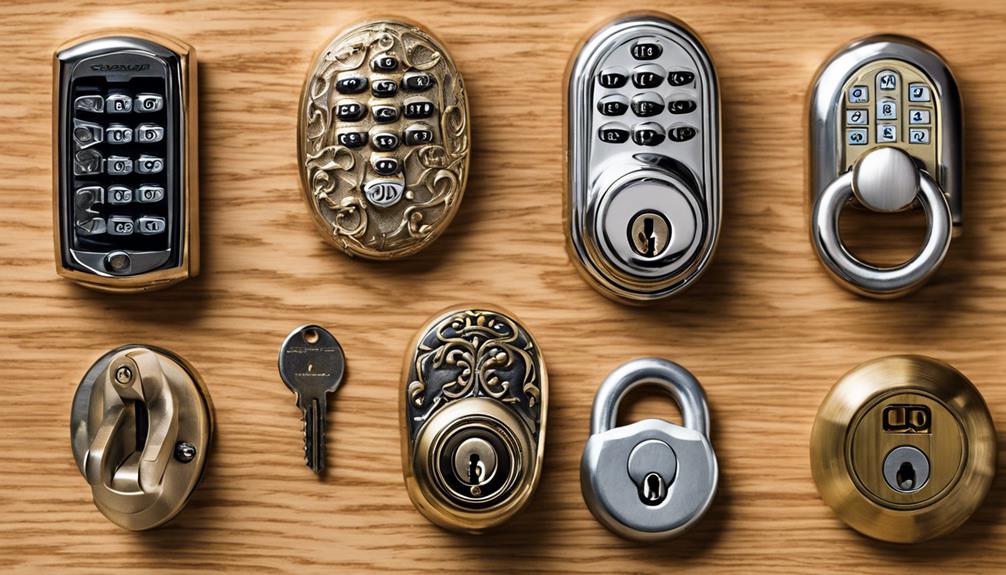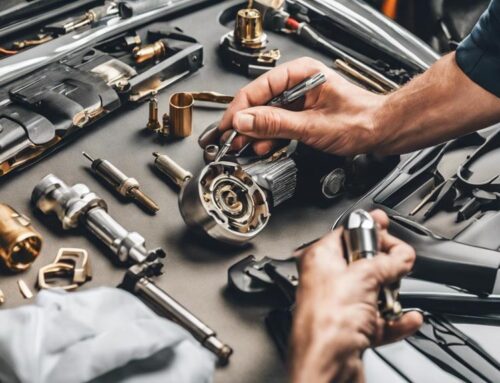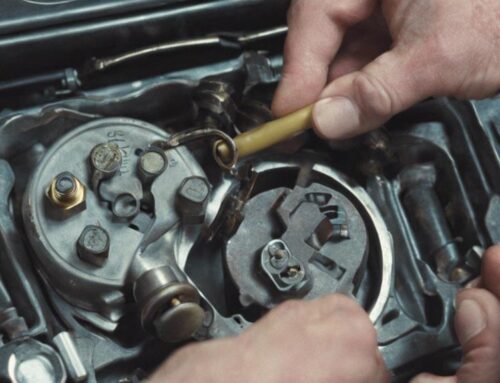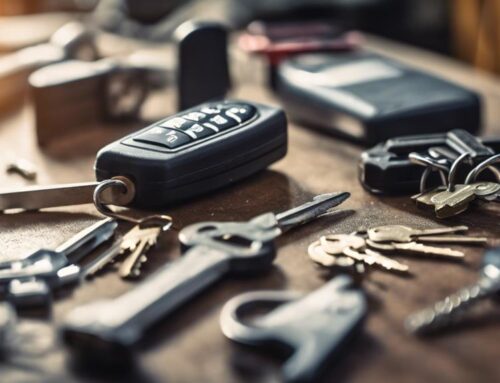It's interesting how you may have just walked past a building that relies on various lock types for security. Understanding what locks, from traditional mechanical to cutting-edge electronic systems, are included in a commercial lock maintenance program is essential for safeguarding your business. Each type serves a unique purpose and offers different levels of security, but are you aware of what's specifically covered? By exploring these options, you can make informed decisions that enhance your property's protection and functionality.
Key Takeaways
- Commercial lock maintenance programs cover traditional mechanical locks, including pin tumbler, disk detainer, and lever locks.
- Electronic locks, featuring keypad entry systems and smart locks, are included for advanced access control.
- High-security locks with patented key control and drill-resistant components are part of these maintenance programs.
- Keyless entry systems that eliminate physical keys and provide customizable access permissions are also covered.
- Regular inspections and maintenance ensure optimal performance and security of all lock types included in the program.
Overview of Lock Maintenance Programs
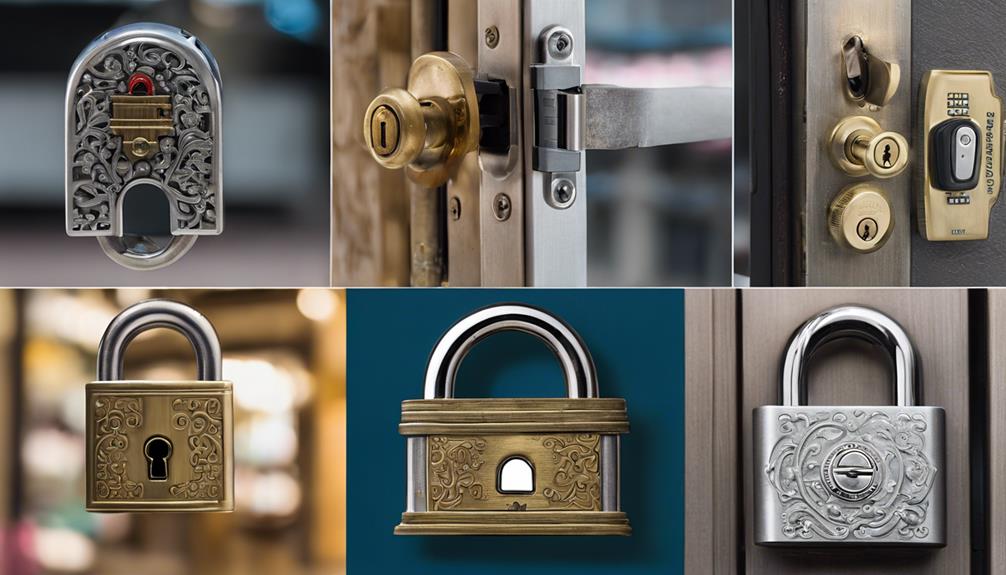
Lock maintenance programs are essential for guaranteeing the reliability and longevity of commercial locking systems. By implementing a structured program, you harness significant lock maintenance benefits, like reducing downtime and increasing security. Regular inspections and servicing act as preventive measures, identifying potential issues before they escalate into costly emergencies. You'll enhance the performance of electronic and high-security locks, optimizing their functionality and lifespan. Moreover, a well-maintained lock system fosters trust among your employees and clients, reinforcing your organization's reputation for safety. These programs also streamline compliance with industry regulations, mitigating risks associated with negligence. Ultimately, investing in a robust lock maintenance strategy empowers you to protect your assets and maintain operational integrity effectively. Additionally, proactive maintenance guarantees that essential security measures are consistently upheld, reducing vulnerabilities and enhancing overall protection.
Traditional Mechanical Locks
Traditional mechanical locks come in various types, each with unique features and security levels. To guarantee peak performance, you should follow best maintenance practices and be aware of common issues that can arise. Understanding these elements will help you keep your locks functioning smoothly and securely.
Types of Mechanical Locks
Mechanical locks play an essential role in securing both residential and commercial properties. Understanding the various lock types is vital for effective security management. The primary mechanical lock mechanisms include pin tumbler locks, disk detainer locks, and lever locks. Pin tumbler locks, commonly found in door hardware, use a series of pins that align at the shear line when a correct key is inserted. Disk detainer locks employ rotating disks to prevent unauthorized access, often used in high-security applications. Lever locks, typically used in commercial settings, consist of a series of levers that must be manipulated in a specific sequence. Each of these mechanical locks offers unique advantages, allowing you to choose the best fit for your security needs. Additionally, high-security locks like disk detainer locks can provide an extra layer of protection against lock picking techniques.
Lock Maintenance Best Practices
Proper upkeep of mechanical locks is essential to guarantee their longevity and reliable performance. Start with regular lock cleaning to remove dirt and debris that can impede function. Use a soft cloth or brush to gently clean the exterior and keyway. For the internal mechanisms, employ appropriate lubrication techniques. Choose a dry lubricant specifically designed for locks; oil-based lubricants can attract dust and grime. Apply a small amount into the keyway and rotate the key several times to distribute it evenly. Don't forget to periodically inspect the lock for any signs of wear or damage, addressing issues before they escalate. By following these practices, you'll make certain your mechanical locks remain secure and operational for years to come. Additionally, locksmiths can help identify any underlying issues that may require attention, ensuring optimal lock performance and security.
Common Mechanical Lock Issues
When it comes to locks, several common issues can arise, impacting their functionality and security. You might encounter problems like sticking or jammed locks, which often stem from dirt accumulation or wear in the locking mechanisms. Misalignment can also hinder lock performance, leading to difficulty in securing doors properly. Additionally, key wear or breakage can compromise the integrity of the lock system. Regular maintenance is crucial to mitigate these issues and guarantee peak performance. Lubricating the internal components and inspecting for wear can extend the lifespan of your locks and enhance security. Addressing these common mechanical lock issues proactively will empower you to maintain a robust security posture for your commercial property. To learn more about lock repair tips in commercial spaces, check out Essential Tips for Lock Repairs in Commercial Spaces.
Electronic Locks Explained
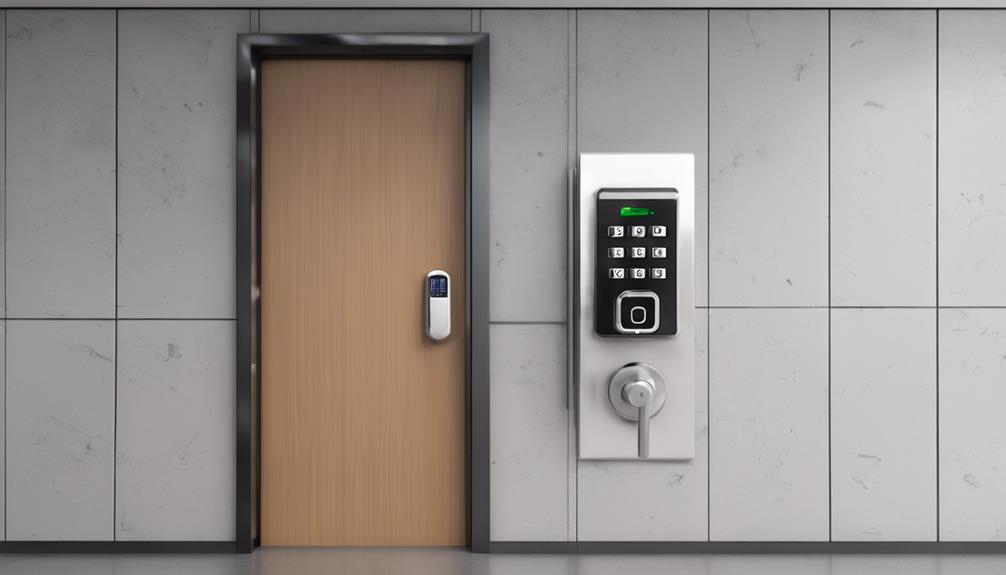
Electronic locks are modern security devices that utilize advanced technology to control access to buildings and sensitive areas. These locks enhance digital security by offering features like remote access, audit trails, and programmable user codes. You can manage access control effectively through keypads, biometrics, or smart card systems, allowing only authorized personnel to enter restricted zones. Unlike traditional locks, electronic locks can be easily integrated with security systems, providing real-time monitoring and alerts. This adaptability not only fortifies your premises but also streamlines the management of access points. By investing in electronic locks, you're leveraging cutting-edge technology to safeguard your assets and maintain strict control over who enters your facility. Embrace this evolution in security for unparalleled protection. Additionally, locksmiths can upgrade, repair, or integrate new technology into an existing security system, as discussed in Enhancing Security With Locksmith Technology Solutions.
Types of Electronic Locks
When considering electronic locks, you'll encounter various types, including keypad entry systems and smart lock technology. Keypad systems require users to input a code, providing straightforward access control. Smart locks, on the other hand, offer advanced features such as remote access and integration with other smart devices, enhancing security and convenience. These technological advancements align with the evolution of electronic locks discussed in the Everything You Need To Know About Electronic Locks knowledge base.
Keypad Entry Systems
Keypad entry systems offer a versatile solution for securing commercial properties, allowing users to control access with ease and efficiency. These systems enhance keypad security by requiring a unique code for entry, minimizing unauthorized access and ensuring that only designated personnel can enter sensitive areas. You can easily manage access control by updating codes as needed, which is essential for maintaining security in dynamic environments. Installation options include standalone units or integration with existing security systems, providing flexibility tailored to your specific needs. In addition, keypad entry systems often feature audit trails, allowing you to monitor who accessed certain areas and when. By implementing such technology, you're investing in a robust security solution that empowers you to maintain control over your property. Additionally, integrating keypad entry systems with cloud-based security solutions can also enhance your access control capabilities and provide real-time monitoring of your premises.
Smart Lock Technology
With the rise of smart technology, smart locks have become an increasingly popular choice for commercial properties looking to enhance security and streamline access control. These locks offer advanced smart lock features, such as remote access, activity monitoring, and programmable user codes, ensuring you maintain command over who enters your premises. Smart lock integration with existing security systems amplifies their effectiveness, allowing for seamless management through mobile apps or centralized software. You can easily adjust permissions, track entry logs, and receive real-time alerts on suspicious activity. This level of control not only elevates your security posture but also optimizes operational efficiency, making your property more secure and your management processes more efficient. Embracing smart locks is a strategic move for any forward-thinking business.
High-Security Locks Overview
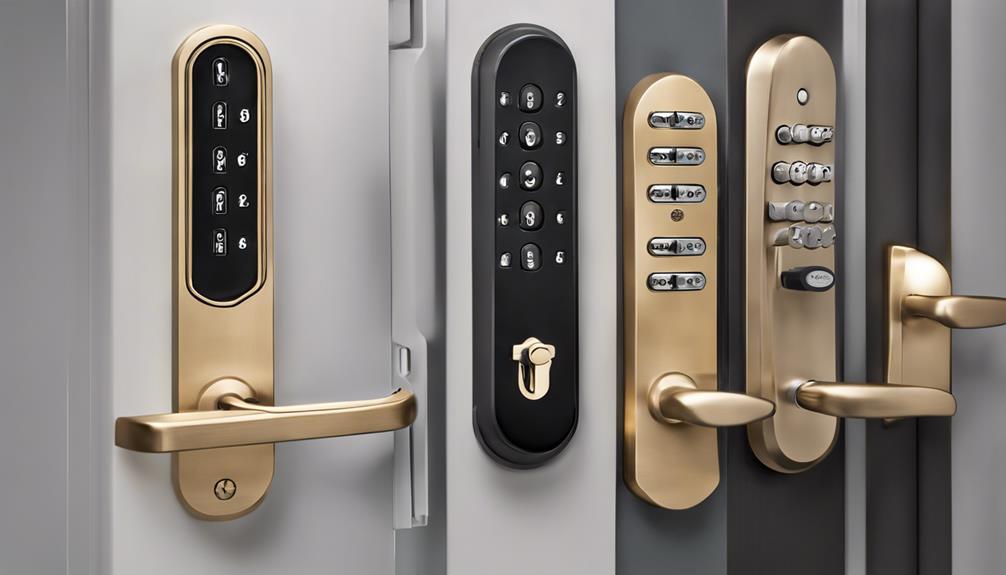
High-security locks are designed to provide enhanced protection against unauthorized access and tampering. These locks incorporate advanced high security features such as patented key control, which limits the distribution and duplication of keys. You'll find that their construction often utilizes hardened materials, ensuring exceptional lock durability that withstands physical attacks and environmental wear. Many high-security locks also include drill-resistant components, reinforced housings, and complex internal mechanisms that thwart picking and bypass attempts. As a powerful solution for securing sensitive areas, these locks are ideal for businesses seeking to elevate their security posture. Investing in high-security locks not only safeguards your assets but also reinforces your commitment to maintaining a secure environment against evolving threats. Additionally, high-security locks offer superior protection due to their pick-resistance and key control features.
Benefits of High-Security Locks
Investing in high-security locks brings numerous advantages that can greatly enhance your security framework. These locks offer robust high security features that deter unauthorized access, giving you peace of mind. Their advanced technology guarantees superior lock durability, minimizing the risk of break-ins and vandalism.
| Advantage | Impact |
|---|---|
| Enhanced Security | Protects valuable assets |
| Increased Durability | Reduces maintenance costs |
| Deterrence Factor | Lowers risk of theft |
Keyless Entry Systems
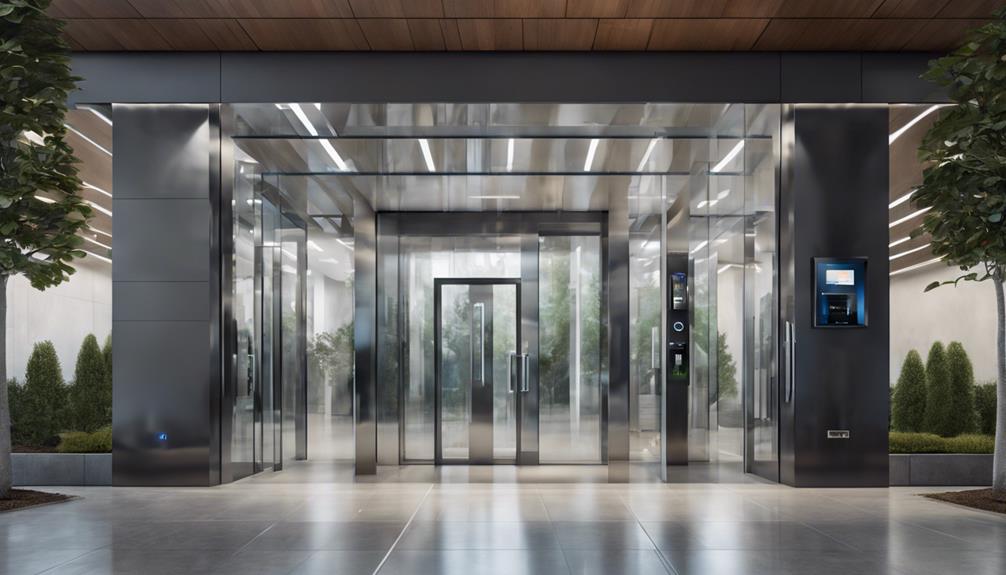
Keyless entry systems offer numerous benefits for commercial properties, including enhanced security and convenience. As you consider implementing these systems, it is crucial to understand their maintenance requirements and the common security features they provide. This knowledge will help you make informed decisions about the best options for your facility.
Benefits of Keyless Systems
Modern businesses are increasingly turning to keyless entry systems for their numerous advantages. One significant benefit is keyless convenience, allowing for swift access without the hassle of traditional keys. This efficiency streamlines operations, especially in high-traffic areas where time is essential. Moreover, these systems provide enhanced security, reducing the risks associated with lost or stolen keys. With features like access logs and customizable permissions, you can monitor and control who enters your premises at any given time, bolstering your overall security posture. Additionally, keyless systems can integrate with other security technologies, creating a robust defense against unauthorized access. By adopting keyless entry, you empower your business to operate more securely and efficiently. Businesses also benefit from the significant improvements in security and convenience offered by keyless systems, as highlighted in the Affordable 24-Hour Nationwide Locksmith for Commercial Keyless Entry Systems article.
Maintenance Requirements Overview
To guarantee peak performance and security, regular maintenance of keyless entry systems is essential. These systems require a proactive approach to guarantee lock durability and ideal functionality. You should establish a maintenance frequency that aligns with the usage and environmental conditions of your facility. Regular inspections help identify potential issues, such as battery depletion or software updates, that could compromise security. Additionally, cleaning keypads and sensors prevents wear and extends the lifespan of the system. Scheduled maintenance can also enhance the efficiency of the locking mechanism and reduce the risk of malfunction. By committing to a disciplined maintenance regimen, you'll guarantee that your keyless entry systems remain reliable and secure, protecting your assets effectively.
Common Security Features
Access control technologies have evolved markedly, offering a range of security features that enhance protection for facilities. Keyless entry systems exemplify this advancement, providing robust lock security through electronic access. By utilizing keypads, biometric scanners, or mobile app integration, you eliminate the vulnerabilities associated with traditional keys. These systems can be programmed to grant or revoke access swiftly, streamlining security management.
Additionally, maintenance technology plays a significant role in ensuring these systems operate smoothly. Regular updates and system checks prevent unauthorized access and enhance overall security. By implementing keyless entry, you're not only upgrading your lock security but also investing in a future-proof solution that adapts to emerging threats, ensuring your facility remains secure and efficient.
Smart Locks in Commercial Settings
In today's fast-paced commercial environment, smart locks provide a robust solution for securing premises while enhancing operational efficiency. These advanced locking systems offer significant smart lock advantages, but you should also be aware of the associated smart lock challenges.
- Keyless Entry: Streamlines access control, eliminating the need for physical keys.
- Real-Time Monitoring: Allows you to track access events and receive alerts on suspicious activity.
- Integration with Security Systems: Enhances overall security by connecting with alarms and surveillance systems.
However, you must consider potential challenges, such as reliance on technology and cybersecurity vulnerabilities. By weighing these factors, you can make informed decisions on implementing smart locks to optimize your commercial security strategy.
Importance of Regular Maintenance
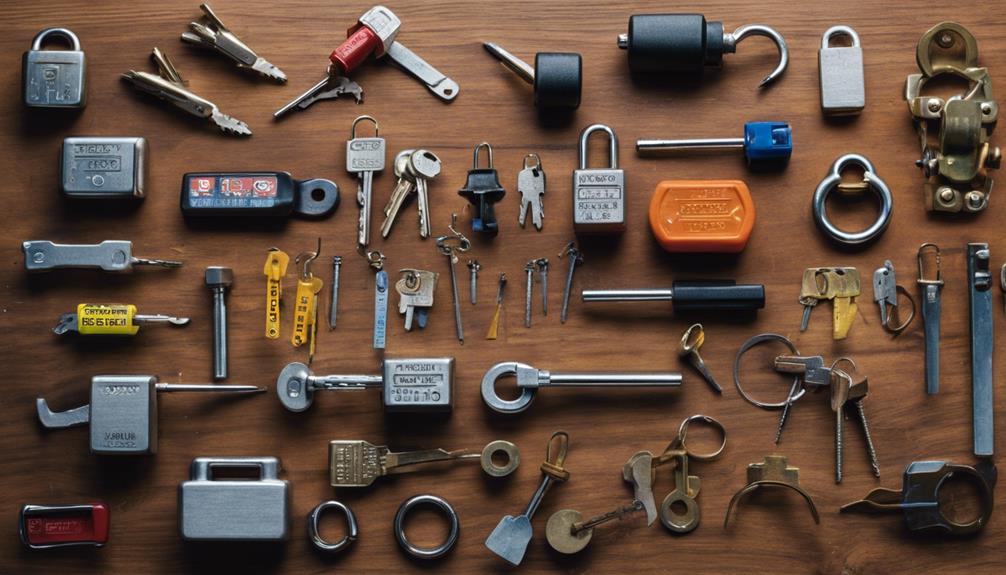
Why is regular maintenance essential for commercial locks? Regular inspections are vital in identifying potential issues before they escalate, ensuring your security measures remain effective. By scheduling these inspections, you can detect wear and tear, misalignments, or malfunctioning components. This proactive approach helps prevent costly repairs and enhances the longevity of your locking systems.
Moreover, lock upgrades may be necessary to stay ahead of evolving security threats. With technology advancing rapidly, outdated locks can compromise your premises. Regular maintenance allows for timely upgrades, ensuring your locks are equipped with the latest security features. Ultimately, maintaining and upgrading your locks isn't just about functionality; it's about fortifying your business against potential risks, giving you peace of mind and control over your security.
24-Hour Services by Low Rate Locksmith
When you need immediate assistance with your commercial locks, Low Rate Locksmith steps in to provide reliable hour services tailored to your specific needs. Our team understands the urgency of lock emergencies and offers affordable options without compromising quality.
You can expect:
- Rapid response: We prioritize your call, ensuring help arrives swiftly.
- Expertise in all lock types: Our technicians are trained to handle electronic and high-security locks, ensuring your business remains secure.
- Comprehensive emergency services: From lockouts to repairs, we cover all aspects of lock maintenance.
With our dedicated hour services, you can trust that your commercial security is in capable hands, allowing you to focus on what truly matters—running your business efficiently.

